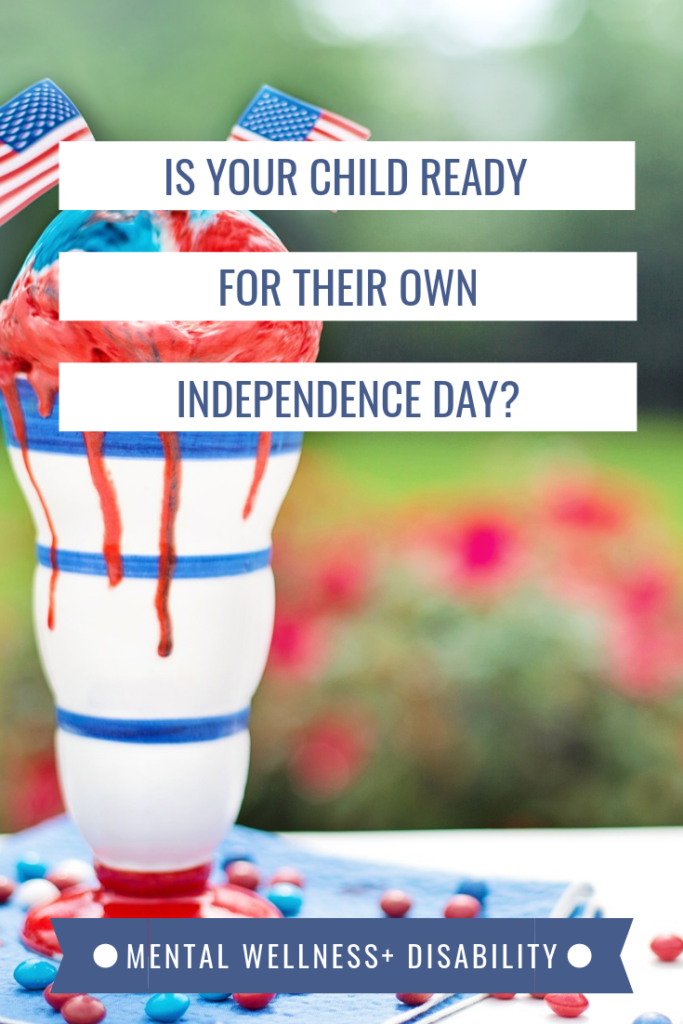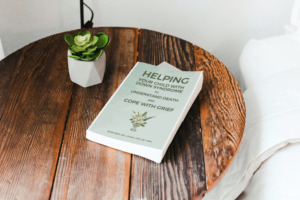It’s Independence Day here in America. Which of course got me thinking about your child’s independence!
A while ago I read this paper, which explores whether certain factors that occur during high school can predict what happens to a young adult with disabilities after high school. The authors were hoping to determine if certain high school experiences would correlate strongly with students working, going to post-secondary school, and living independently.

How does what happens in high school predict what happens after high school for kids with disabilities?
The authors found that four factors could predict positive outcomes in all three areas of living independently, having a job, and attending post-secondary education:
- Inclusion in general education
- Paid employment/work experience
- Self-care/independent living skills
- Student support (defined as the hours per week that students spent with friends and family)
Factors that didn’t have such an impact on all three include parental involvement, social skills, and program of study, among others.
Limitations of this research
As with any study, it’s important to look at the limitations of the study before inferring too much.
First, consider that this study only looked for correlations between various in-school factors and post-high school outcomes. This does not mean that those factors caused the post-high school outcomes, only that there seems to be a relationship between them.
Also, it’s important to consider that the authors defined criteria for the studies that they would include in this evaluation, and so not all studies looking at these correlations and outcomes were included.
What does this research about post high school independence mean for you and your child?
I talk to so many special needs parents in counseling who tell me they aren’t afraid to be ‘that parent’.
They say:
“I want my child to have the best life. I don’t care if the school thinks I’m a nuisance. I’ll request extra IEP meetings and will do whatever it takes for my child.”
I applaud these parents for their desire to advocate for their child. They are fearless and tireless in their pursuit of giving their child the best life possible.
But what if they’re missing the mark?
This research suggests that maybe advocating for your child and liaising with their school isn’t actually the best way to set your child up for success after high school.
Promoting your child’s independence in daily living and self-care, encouraging them to work, and simply being there and spending time with them might have a stronger impact on what happens after high school. Certainly it seems that advocating for your child’s inclusion in general education classes is helpful, but keep in mind that number of IEP meetings and hours spent collaborating with schools were not strong indicators of post-high school success.
Of these skills, the one that I find most parents struggle with is encouraging the development of self-care skills.
How can I be sure my child is ready for independence by helping them develop self-care skills?
Here are a few steps to take:
Get on the same page with your parenting partner. Before you do anything else, if you are raising your child with a partner, it’s critical that agree to what your goals and methods will be. This is especially important if you see that your child could be more independent, but your partner disagrees
Say you were wrong. I talk to parents all the time who have realized that they have allowed their child to ‘stay stuck’. These parents see that their child has developed some dependency on them. They worry that perhaps it’s too late, that they can’t build their child’s independence. They fear that they have done some irreparable damage.
I love reminding these parents that kids, even adult kids, LOVE it when their parents say “I was wrong!”
Sit down with your child and be clear in identifying what you’ve done that’s contributed to your child not developing self-care skills. Acknowledge that this was a mistake. Be very explicit in talking about how your behavior and your expectations of your child will change moving forward. It might sound like this:
“Tim, I have really messed up. For a long time I thought it was important that your bedroom be clean, and so every day I would pick up your dirty clothes off the floor and put them into the hamper for you. That was a mistake, because I know now that, yea, it’s important for your room to be clean, but what’s really important for you is that you know how to keep it clean. I’m sorry that I didn’t give you the chance to learn that, but I’m ready to change. Starting tonight, it will be your job to get your dirty clothes into the hamper. I won’t remind you or nag you about it. I trust that you can handle, and I’m just sorry that I didn’t let you start years ago. Do you have any questions?”
Start somewhere. Anywhere.
Don’t do nothing because you can’t do everything. Ask yourself at each point in your daily routine, is this where we want things to be in a year? How about in 5 years, or 10?
If your child’s abilities to care for themselves and make decisions are not where they need to be to be independent, ask yourself this simple question: What’s one small step we could make that would encourage more independence? If you see that your child could be more independent in their personal care, here’s a strategy that might help.
How have you promoted your child’s independence?
Do you agree with the authors? Are self-care, time with family, and work experience key ingredients to post-high school success?
Leave a comment and share your thoughts!












